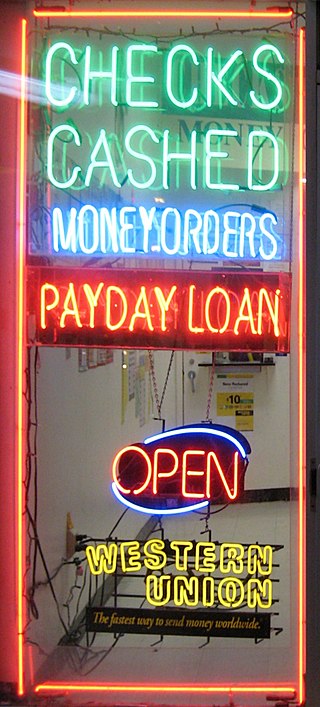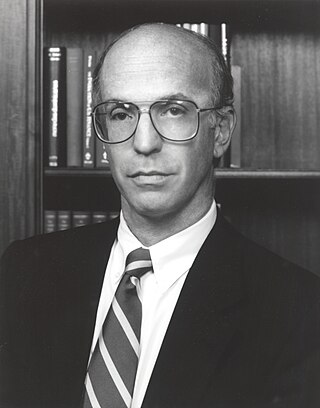Related Research Articles

The Federal Deposit Insurance Corporation (FDIC) is a United States government corporation supplying deposit insurance to depositors in American commercial banks and savings banks. The FDIC was created by the Banking Act of 1933, enacted during the Great Depression to restore trust in the American banking system. More than one-third of banks failed in the years before the FDIC's creation, and bank runs were common. The insurance limit was initially US$2,500 per ownership category, and this has been increased several times over the years. Since the enactment of the Dodd–Frank Wall Street Reform and Consumer Protection Act in 2010, the FDIC insures deposits in member banks up to $250,000 per ownership category. FDIC insurance is backed by the full faith and credit of the government of the United States, and according to the FDIC, "since its start in 1933 no depositor has ever lost a penny of FDIC-insured funds".

In the United States, banking had begun by the 1780s, along with the country's founding. It has developed into a highly influential and complex system of banking and financial services. Anchored by New York City and Wall Street, it is centered on various financial services, such as private banking, asset management, and deposit security.

Public Interest Research Groups (PIRGs) are a federation of U.S. and Canadian non-profit organizations that employ grassroots organizing and direct advocacy on issues such as consumer protection, public health and transportation. The PIRGs are closely affiliated with the Fund for the Public Interest, which conducts fundraising and canvassing on their behalf.

A payday loan is a short-term unsecured loan, often characterized by high interest rates. These loans are typically designed to cover immediate financial needs and are intended to be repaid on the borrower's next payday.

The Community Reinvestment Act is a United States federal law designed to encourage commercial banks and savings associations to help meet the needs of borrowers in all segments of their communities, including low- and moderate-income neighborhoods. Congress passed the Act in 1977 to reduce discriminatory credit practices against low-income neighborhoods, a practice known as redlining.

Alan Stuart Blinder is an American economics professor at Princeton University and is listed among the most influential economists in the world. He is a leading macro-economist, politically liberal, and a champion of Keynesian economics and policies.

The Consumer Federation of America (CFA) is a non-profit organization founded in 1968 to advance consumer interests through research, education and advocacy.
Consumers International is the membership organization for consumer groups around the world. Founded on 1 April 1960, it has over 250 member organizations in 120 countries. Its head office is situated in London, England, and has numerous regional offices in Latin America, Asia Pacific, Middle East and Africa.
Kerry Killinger is an American businessman and author. He is founder and CEO of Crescent Capital Associates, and previously served as chairman and chief executive officer of Washington Mutual from 1990 until 2008.
Colston Estey Warne was an American professor of economics and one of the founders of Consumers Union, in 1936. He served as president of the board of directors from 1936 to 1979. He also served as President of the International Organization of Consumers Unions (IOCU) from 1960 to 1970, which later became Consumers International under Rhoda Karpatkin. He was the father of Barbara Newell.

Sheila Colleen Bair is an American former government official who was the 19th Chair of the U.S. Federal Deposit Insurance Corporation (FDIC) from 2006 to 2011, during which time she shortly after taking charge of the FDIC in June 2006 began warning of the potential systemic risks posed by the growing trend of subprime-mortgage-backed bonds, and then later assumed a prominent role in the government's response to the 2008 financial crisis. She was appointed to the post for a five-year term on June 26, 2006, by George W. Bush through July 8, 2011. She was subsequently the 28th president of Washington College in Chestertown, MD, the first female head of the college in its 234-year history, a position she held from 2015 until her resignation in 2017.

Thomas Michael Hoenig is a Distinguished Senior Fellow at the Mercatus Center. He became a director of the Federal Deposit Insurance Corporation on April 16, 2012, and served as vice chairman from November 30, 2012 to April 30, 2018. From 1991 to 2011, he served as the eighth chief executive of the Tenth District Federal Reserve Bank, in Kansas City, United States. In 2010, he was serving as a voting member of the Federal Open Market Committee, as one of five of the twelve Federal Reserve Bank presidents that sit on the Committee on a yearly rotating basis. He is known as an "anti-inflation hawk".
Bank regulation in the United States is highly fragmented compared with other G10 countries, where most countries have only one bank regulator. In the U.S., banking is regulated at both the federal and state level. Depending on the type of charter a banking organization has and on its organizational structure, it may be subject to numerous federal and state banking regulations. Apart from the bank regulatory agencies the U.S. maintains separate securities, commodities, and insurance regulatory agencies at the federal and state level, unlike Japan and the United Kingdom. Bank examiners are generally employed to supervise banks and to ensure compliance with regulations.
The unbanked are adults who do not have their own bank accounts. Along with the underbanked, they may rely on alternative financial services for their financial needs, where these are available.

The Dodd–Frank Wall Street Reform and Consumer Protection Act, commonly referred to as Dodd–Frank, is a United States federal law that was enacted on July 21, 2010. The law overhauled financial regulation in the aftermath of the Great Recession, and it made changes affecting all federal financial regulatory agencies and almost every part of the nation's financial services industry.

Michael S. Barr is an American legal scholar who has been serving as second vice chair of the Federal Reserve for supervision since 2022. From 2009 to 2011, he was assistant secretary of the treasury for financial institutions under President Barack Obama. At the University of Michigan, he has been serving as faculty member since 2001, professor of law since 2006, professor of public policy since 2014.
This article details the history of banking in the United States. Banking in the United States is regulated by both the federal and state governments.
The consumer movement is an effort to promote consumer protection through an organized social movement, which is in many places led by consumer organizations. It advocates for the rights of consumers, especially when those rights are actively breached by the actions of corporations, governments, and other organizations that provide products and services to consumers. Consumer movements also commonly advocate for increased health and safety standards, honest information about products in advertising, and consumer representation in political bodies.

Product testing, also called consumer testing or comparative testing, is a process of measuring the properties or performance of products.

Rohit Chopra is an American consumer advocate who is the third director of the Consumer Financial Protection Bureau (CFPB) and previous member of the Federal Trade Commission (FTC). Prior to this, Chopra served as assistant director of the CFPB and as the agency's first Student Loan Ombudsman, an office created by the Dodd–Frank Act.
References
- 1 2 3 4 5 "FDIC: Advisory Committee Member Biographies". fdic.gov. 21 February 2008. Retrieved 23 April 2013.
- ↑ Koenenn, Connie (December 16, 1994). "THE GOODS : A Muckraker for the '90s : As Head of the Consumer Federation of America, Stephen Brobeck Sees a More Educated Shopper Unafraid to Take On a More Complex Marketplace". Los Angeles Times . Retrieved 23 April 2013.